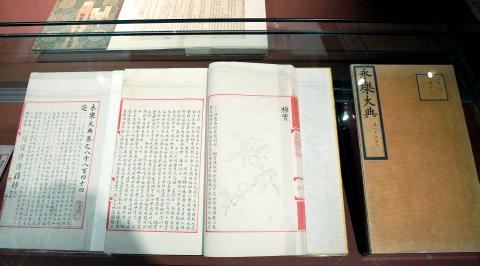The Agency Against Corruption yesterday arrested two National Palace Museum employees on suspicion they stole digital images of national treasures and sold them to Chinese companies.
The agency said research staff member Chen Yao-tung (陳耀東) and his assistant, surnamed Yeh (葉), had joined a program at the museum to produce digital images of artifacts through advanced digital photography.
Both are suspected of copying images of the Tibetan-language gilt manuscript the Dragon Sutra (龍藏經), the Yongle Encyclopedia (or Yongle Canon, 永樂大典), a volume of paintings from the Song Dynasty and other items, and allegedly selling the digital copies to Chinese companies via a front company that Chen established in Taiwan.

Photo: Wang Wen-lin, Taipei Times
The agency said Chinese companies had sold unauthorized prints of those digital images.
Agency officials yesterday raided Chen’s and Yeh’s offices at the museum, as well as their houses and companies they own.
The agency said the two would be charged with corruption and contravening the Copyright Act (著作權法).
The museum said the Dragon Sutra manuscript, also known as the Tripitaka in Manchu, was completed more than three centuries ago during the eighth year of the reign of Qing Emperor Kangxi (1669). Written in gilt standard Tibetan script on both sides of the paper, the massive manuscript contains 108 sets comprising about 100,000 pages. The manuscript contains 1,100 Buddhist sutras.
The agency said the museum spent seven years producing images of the Dragon Sutra and had authorized a company to begin making copies in January 2008, selling them for NT$1.88 million (US$60,000). The firm issued 500 copies of the manuscript in January.
The agency said the reproduced Dragon Sutra has attracted the interest of a number of Buddhists and entrepreneurs,
The agency said a Chinese company has sold fake copies of the Dragon Sutra for about NT$100,000.
The Yongle Encyclopedia is a Chinese compilation commissioned by the Yongle Emperor of the Ming Dynasty in 1403 and completed in 1408. It was the world’s earliest and largest general encyclopedia.
Additional reporting by AP

Taiwanese actress Barbie Hsu (徐熙媛) has died of pneumonia at the age of 48 while on a trip to Japan, where she contracted influenza during the Lunar New Year holiday, her sister confirmed today through an agent. "Our whole family came to Japan for a trip, and my dearest and most kindhearted sister Barbie Hsu died of influenza-induced pneumonia and unfortunately left us," Hsu's sister and talk show hostess Dee Hsu (徐熙娣) said. "I was grateful to be her sister in this life and that we got to care for and spend time with each other. I will always be grateful to

REMINDER: Of the 6.78 million doses of flu vaccine Taiwan purchased for this flu season, about 200,000 are still available, an official said, following Big S’ death As news broke of the death of Taiwanese actress and singer Barbie Hsu (徐熙媛), also known as Big S (大S), from severe flu complications, the Centers for Disease Control (CDC) and doctors yesterday urged people at high risk to get vaccinated and be alert to signs of severe illness. Hsu’s family yesterday confirmed that the actress died on a family holiday in Japan due to pneumonia during the Lunar New Year holiday. CDC Deputy Director-General Tseng Shu-hui (曾淑慧) told an impromptu news conference that hospital visits for flu-like illnesses from Jan. 19 to Jan. 25 reached 162,352 — the highest

COMBINING FORCES: The 66th Marine Brigade would support the 202nd Military Police Command in its defense of Taipei against ‘decapitation strikes,’ a source said The Marine Corps has deployed more than 100 soldiers and officers of the 66th Marine Brigade to Taipei International Airport (Songshan airport) as part of an effort to bolster defenses around the capital, a source with knowledge of the matter said yesterday. Two weeks ago, a military source said that the Ministry of National Defense ordered the Marine Corps to increase soldier deployments in the Taipei area. The 66th Marine Brigade has been tasked with protecting key areas in Taipei, with the 202nd Military Police Command also continuing to defend the capital. That came after a 2017 decision by the ministry to station

PETITIONS: A Democratic Progressive Party official quoted President William Lai as saying that civil society groups are organizing the recall drives at the grassroots level Some civil society groups yesterday announced that they have collected enough signatures to pass the first-stage threshold to initiate a recall vote against Chinese Nationalist Party (KMT) legislators in 18 constituencies nationwide, saying that they would submit the signatures to the Central Election Commission (CEC) today. They also said that they expected to pass the threshold in eight more constituencies in the coming days, meaning the number of KMT legislators facing a recall vote could reach 26. The groups set up stations to collect signatures at local marketplaces and busy commercial districts. The legislators their petition drives target include Fu